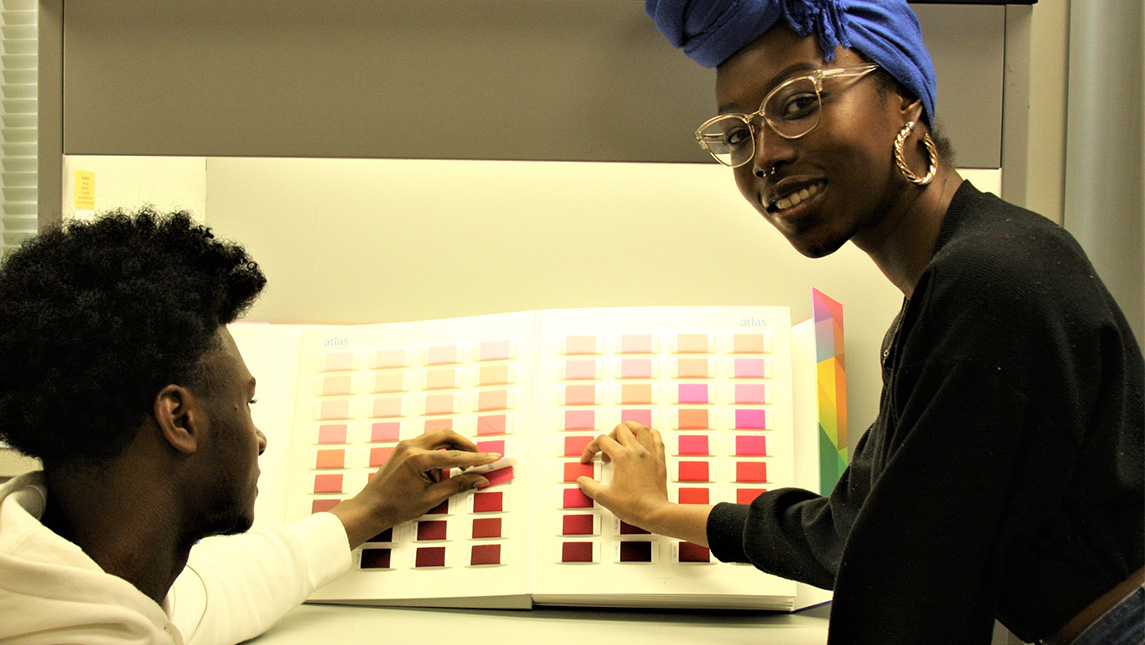When consumers are looking to buy new clothes – whether a high-end designer brand or secondhand – color is one of the biggest deciding factors.
Starting this academic year, students in the Bryan School’s Consumer, Apparel, and Retail Studies (CARS) program will use some of the same color tools used by the apparel industry.
Lecturer and Internship Director Anne Wood ’14 knows from experience how much attention clothing manufacturers give to color. She has worked for companies such as Lane Bryant, Cato, and Delta Apparel. She serves on the Color Association of the United States Women’s Forecasting Committee – forecasting colors that will drive clothing sales in the years ahead.
That is why she looks forward to introducing her textile lab students to the Color Atlas, donated this year by the company Archroma.
“The most important part of color management is consistent colors,” she says. “And that needs to come from a service such as Archroma. Having their color management system is a real coup.”
The Swiss-based company gave the department its five books of colors for cotton and three for polyester. It also provided access to all the digital files, which means students can easily use the Color Atlas with their 3D digital design software, VStitcher.
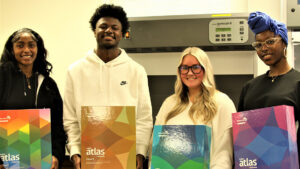
This donation is the first of its kind for the department. Wood had samples she saved from her job at Delta, but faculty had never gained access to any company’s full set of fabric color until now.
“This rounds out the whole color management process. We can show the students how it all works. That is why we’re so grateful for this donation.”
Keeping up with a changing industry
Archroma has offices in Charlotte. It reached out to CARS Department Head Dr. Nancy Hodges through LinkedIn to offer the Color Atlas to UNCG.
“I think they wanted a school that has a local fashion program,” says Dr. Hodges. “My understanding is they are trying to expand the educational aspect of the company, so that more students are aware of the brand before they get into the industry.”
This practical experience gives students an advantage when they apply for jobs in the highly competitive fashion industry.
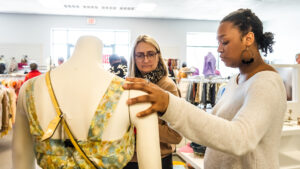
It is not feasible for a student to master every piece of software and equipment while in school, especially since the technology constantly changes.
Dr. Hodges says that what employers look for in new hires is the confidence to adapt.
“Our students can say, ‘Yes, I may not know this particular software, but I can learn how to use it. I don’t necessarily have experience with this particular equipment or technology, but I have enough experience with similar technologies to know I can learn it and be proficient at it.'”
Wood sees this on display when she visits UNCG interns. “I went to Under Armour. We had a student working in the sourcing department where they interface with color. When we walked into the color room, there was the color spectrophotometer. Under Armour uses a different one than Archroma, but my student had already seen a spectrophotometer in our lab. It’s not so scary when they get into the workplace.”
A win-win for students and employers
Archroma is not the first apparel company CARS has worked with closely, and UNCG students have been reaping the benefits for years.
One of the ways they stay “externally-facing,” as Dr. Hodges puts it, is by building relationships through the CARS industry advisory board.
“We have a student interning at Under Armour because one of our board members is with Under Armour. They had ten thousand applicants for just 60 internship slots this summer. They had one of these slots reserved specifically for a CARS student.”
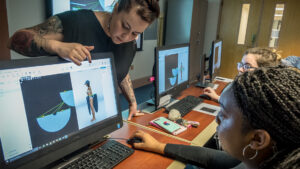
Eleven interns spent this summer with Kontoor Brands. It is the most interns CARS has ever had with the company at one time, which is based in Greensboro and makes the Wrangler and Lee brands.
“Six or seven years ago, they came to us and said they were moving virtual,” said Dr. Hodges. “They were using this software called VStitcher. They said, ‘We want your students to be knowledgeable in VStitcher, so we can continue to hire them.'”
The technology is priced for major corporations; an educational institution could not afford to buy it on its own. Kontoor helped CARS get software licenses donated and provided training on the software to CARS faculty at no cost.
“It’s a win-win for our department and for Kontoor Brands,” says Wood.
Students tackle real-world problems
CARS students don’t have to wait for internships to work with apparel companies.
For the capstone class, they hear a real-world question posed by a real-life company. Students then create a plan of action.
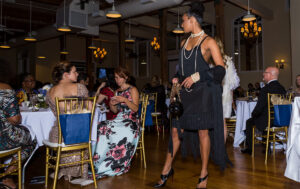
“The students work together in cross-functional teams, just like you would see in the industry,” says Dr. Hodges. “You have somebody who’s a designer working with somebody who’s in sourcing, and in marketing, retail, and distribution.”
In Spring 2022, the Lee brand asked students to create a marketing strategy for selling its jeans in different countries. Along with v-Stitcher, students used a virtual retailing program the CARS department also teaches called “Mock Shop,” which lets them design a virtual retail store, so they can see how clothing makes it from manufacturing to sales.
Another capstone project was for Unifi, a company headquartered in Greensboro that makes Repreve, a yarn made out of recycled water bottles. Students helped Unifi develop concepts for sustainable apparel products that use the Repreve fiber.
UNCG has been preparing students for the apparel industry since it opened its doors in the 1890s. The CARS department celebrated its 100th year as an academic department in 2017.
When it comes to student success, faculty and staff always have their eyes on the future.
“One of the most critical things that we do for our students is provide that initial exposure,” says Dr. Hodges. “They can go as far with it as they want while they’re with us.”
Story by Janet Imrick, University Communications
Photography by Martin W. Kane, Alycee Byrd, and Jiyoung Park, University Communications; and courtesy of Archroma
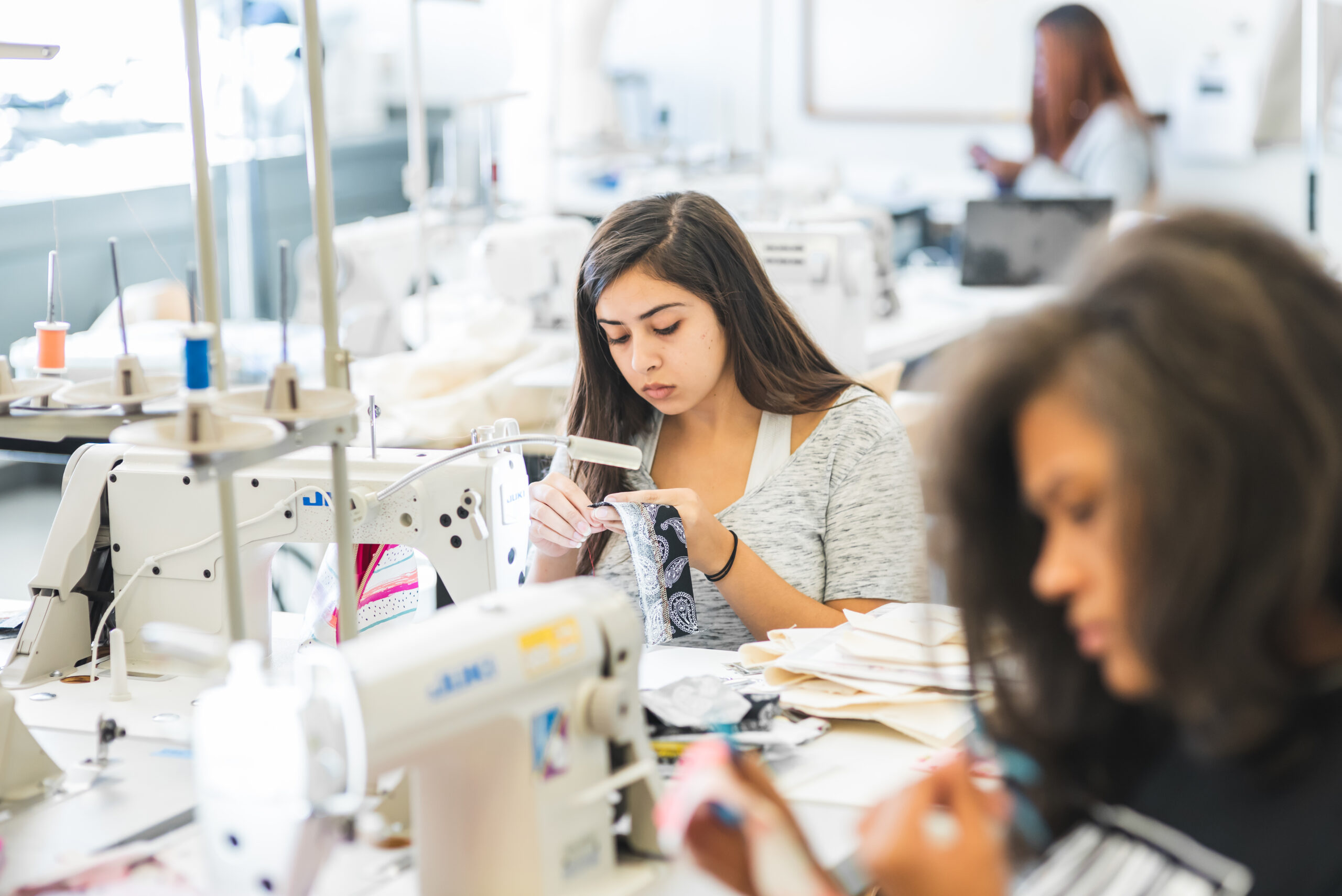
Explore Consumer, Apparel, and Retail Studies
Our students have a high rate of placement in the field — many even before graduation. They choose our program for its close connection with industry leaders, a student-centered learning environment, and internships from North Carolina to New York and beyond.
